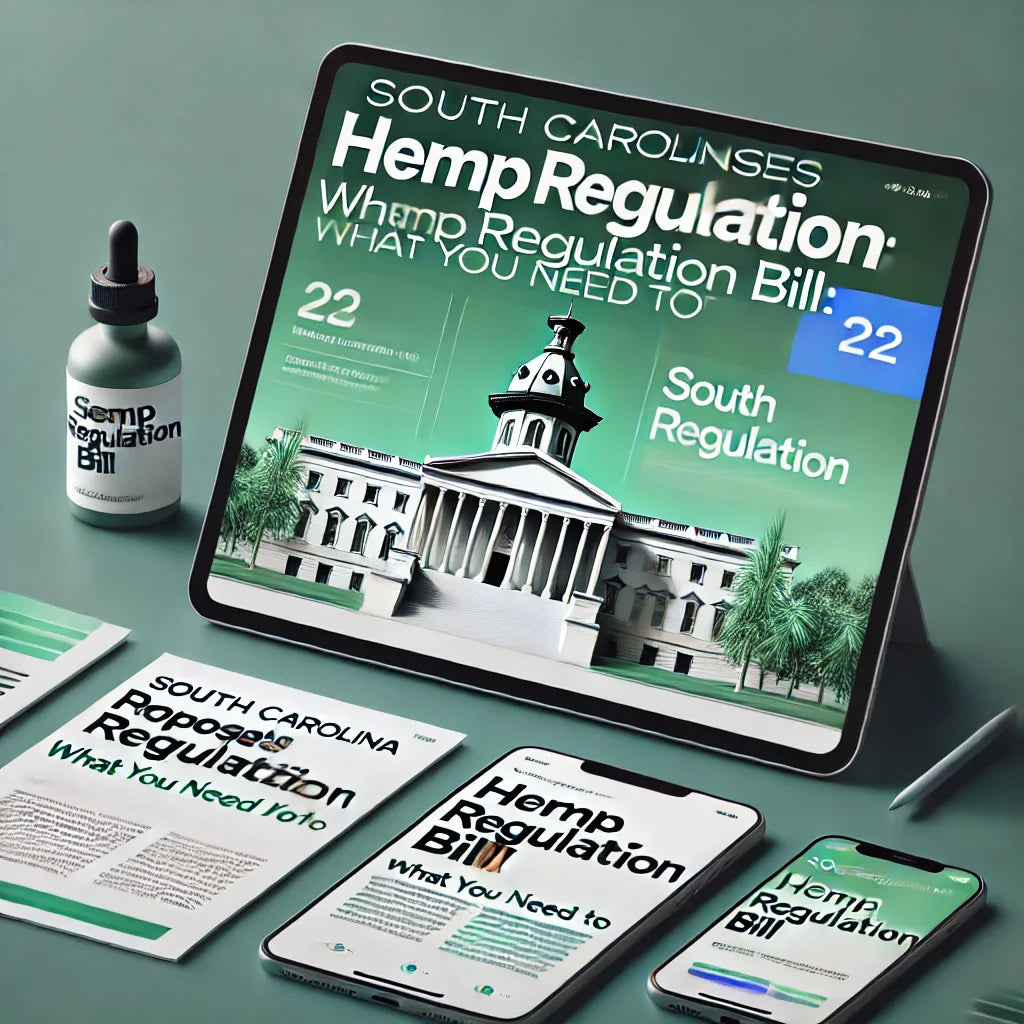
South Carolina Proposes Hemp Regulation Bill: What You Need to Know
The South Carolina General Assembly is considering an amendment to House Bill 3924 that could establish a comprehensive framework for regulating hemp-derived consumable products within the state. This proposed legislation comes as hemp products, including items containing cannabinoids like CBD and delta-8 THC, continue to gain popularity among consumers.
For hemp business owners, South Carolina residents, and legal professionals, this legislation has far-reaching implications. Whether you're managing a hemp-based business, advocating for compliance, or simply wanting to stay informed, here's everything you need to know about South Carolina's proposed changes and their potential impact on the hemp industry.
What Are Hemp-Derived Consumable Products?
Before we explore the proposed amendments, it's essential to understand what hemp-derived consumable products are.
The amendment to Section 46-56-10 defines "hemp-derived consumable products" as the following:
>"A final form hemp product intended for human ingestion or inhalation that contains a delta-9 THC concentration of not more than three-tenths of one percent (0.3%) on a dry weight basis but may contain concentrations of other hemp-derived cannabinoids, in excess of that amount."
This definition excludes the following:
-
Hemp products meant for topical application.
-
Hemp seeds or seed-derived ingredients that are recognized as safe by the FDA.
Aligning South Carolina's definition of hemp-derived consumables with neighboring states like Georgia, Tennessee, and the proposed North Carolina legislation offers consistency for interstate commerce and regulatory clarity.
Key Changes Proposed
The amendment introduces specific measures to regulate the sale, possession, and merchandising of hemp-derived consumable products. Here’s a detailed breakdown of the proposed changes:
1. Age Restrictions
-
Retailers cannot sell hemp-derived consumables to anyone under 21 or to individuals purchasing on behalf of someone under 21.
2. Sampling Restrictions
-
Free distribution of product samples is prohibited in public spaces, including streets, sidewalks, and parks.
3. Placement Restrictions
-
Except for items in beverage form, all hemp-derived consumables must be displayed behind the retail counter, making them inaccessible for customers to handle directly.
4. Merchandising Requirements
-
Hemp-infused beverages must include clear labels, signage, or stickers that indicate the product contains hemp-derived cannabinoids for transparency and consumer awareness.
5. Employee Provisions
-
Employees aged 18 and over can legally handle hemp-derived products as part of their job duties without violating possession laws. However, bartenders serving hemp beverages must still be at least 21 years old.
6. Signage Requirements
-
Retailers must display visible signs stating:
-
It is illegal for individuals under 21 to possess or purchase hemp consumables.
-
Falsifying age information to purchase these products is prohibited.
Penalties for Non-Compliance
To ensure adherence, the proposed legislation outlines specific penalties for violations.
For Retailers or Individuals Who Sell to Minors
-
Offense: Selling to minors or facilitating sales to someone under 21.
-
Penalties: Misdemeanor charges, fines ranging between $200-$500, and/or up to 30 days of imprisonment.
For Underage Possession
-
Offense: Minors under 21 found possessing hemp-derived consumables.
-
Penalties: Misdemeanor charges, fines ranging between $100-$200, and/or up to 30 days of imprisonment.
For Signage Violations
-
Offense: Failure of retailers to display the mandated signage.
-
Penalties: Misdemeanor charges, with fines up to $100 or imprisonment of up to 30 days.
Authority and Enforcement
The South Carolina Department of Agriculture is tasked with enforcing this legislation. Key responsibilities include:
-
Reducing sales to individuals under 21.
-
Conducting random inspections of retail outlets.
-
Preparing an annual report detailing their enforcement efforts and presenting it to the General Assembly.
Additionally, law enforcement officers will initially adopt a 90-day warning period following the Act’s effective date. During this time, violators will receive warnings for non-compliance rather than formal charges.
Important Considerations for Businesses and Consumers
1. The Legislation Does Not Legalize THC Beyond 0.3%
It’s important to note that this Act does not legalize any THC levels exceeding the federally prohibited threshold of 0.3% delta-9 THC on a dry weight basis.
2. Stricter Federal or State Laws Supersede
This legislation will not override any stricter existing federal laws or South Carolina state laws regarding THC or other controlled substances.
3. A Step Toward a Regulatory Framework
The proposed bill represents an initial step toward creating a more organized regulatory framework for hemp-derived products. This framework would provide clarity for businesses and consumers alike while fostering transparency, compliance, and trust across the industry in South Carolina.
Why This Matters
For hemp business owners, compliance with these regulations could significantly impact operations. Businesses will need to adapt their retail practices, marketing strategies, and staff education to meet these guidelines while staying competitive in the market.
South Carolina residents and consumers of hemp-derived products will benefit from enhanced transparency and safety measures for these goods, ensuring responsible use and distribution.
For legal professionals, this legislation provides an opportunity to assist clients in navigating compliance and minimizing risks amid growing regulation of the hemp industry.
What’s Next?
This legislation is still under consideration, and stakeholders—businesses, consumers, and legal advisors—should stay informed about its progress. Monitoring updates from the South Carolina General Assembly and Department of Agriculture is crucial as this regulatory shift unfolds.
Additionally, business owners and legal professionals can benefit from consulting experts to ensure they effectively adapt to the changing regulatory landscape once the bill is enacted.
Stay Prepared
Hemp-derived consumables are an evolving segment of the market, and this proposed bill underscores the need for greater responsibility and regulation. Whether you're a business owner or a consumer, staying educated and proactive is vital to ensuring compliance and creating an industry built on trust and transparency.
